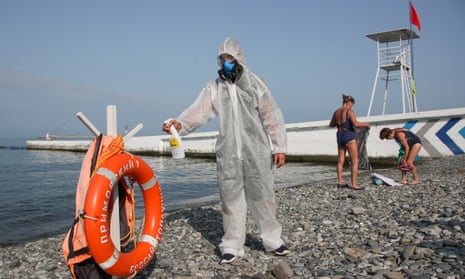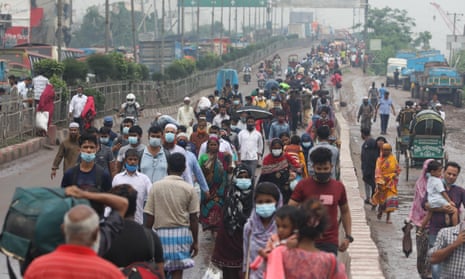This blog is closed. Follow the latest updates on the pandemic from around the world:
Poland announces quarantine for UK travellers – as it happened
This blog is closed. Follow the latest updates on the pandemic from around the world:
Tue 22 Jun 2021 18.47 EDT
First published on Tue 22 Jun 2021 00.29 EDT- New Zealand mulling lockdown in Wellington after positive Covid-19 case
- A summary of today's developments
- Poland announces quarantine for travellers from the UK
- Today so far...
- Russia reports 546 Covid-linked death, most in single day since February
- WHO concerned by easing of restrictions in Euro 2020 host cities as Wembley capacity increased
- Biden to accept failure to meet domestic vaccine goal, after global jab pledge missed
- Cuba claims its three-shot jab is 92% effective without citing data
- China plans to retain border restrictions for another year - report
- Most recent Delta variant mutation present across UK, US, Russia, Japan, elsewhere
- Today so far…
- EU ready to extend mechanism to monitor and limit vaccine export until September
- Kremlin: unvaccinated people in the workplace 'pose a threat to those around them'
- Italy to lift outdoor face mask requirement from 28 June
- Hancock: UK government 'working on' plan for quarantine-free travel for double-vaccinated
- US average deaths fall below 300 for first time since March 2020
- Scotland to announce ‘life beyond level zero’
- North Korea tells WHO it has detected no cases
- Summary

Live feed
- New Zealand mulling lockdown in Wellington after positive Covid-19 case
- A summary of today's developments
- Poland announces quarantine for travellers from the UK
- Today so far...
- Russia reports 546 Covid-linked death, most in single day since February
- WHO concerned by easing of restrictions in Euro 2020 host cities as Wembley capacity increased
- Biden to accept failure to meet domestic vaccine goal, after global jab pledge missed
- Cuba claims its three-shot jab is 92% effective without citing data
- China plans to retain border restrictions for another year - report
- Most recent Delta variant mutation present across UK, US, Russia, Japan, elsewhere
- Today so far…
- EU ready to extend mechanism to monitor and limit vaccine export until September
- Kremlin: unvaccinated people in the workplace 'pose a threat to those around them'
- Italy to lift outdoor face mask requirement from 28 June
- Hancock: UK government 'working on' plan for quarantine-free travel for double-vaccinated
- US average deaths fall below 300 for first time since March 2020
- Scotland to announce ‘life beyond level zero’
- North Korea tells WHO it has detected no cases
- Summary
New Zealand mulling lockdown in Wellington after positive Covid-19 case
New Zealand is considering locking down capital city Wellington on Wednesday after an Australian tourist tested positive for coronavirus after visiting the city over the weekend.
“Everything is on the table,” Dr. Ashley Bloomfield told Radio New Zealand when asked if a lockdown in Wellington was an option being considered to curb any potential outbreak. Bloomfield said the person travelled as a tourist and there would be quite a number of exposure sites.
The person most likely contracted the virus before flying across the Tasman Sea, he added, Reuters reports.
Morgan Stanley’s staff and clients will not be allowed to enter the bank’s New York offices if they are not fully vaccinated, the Financial Times reported, citing an internal memo.
The new policy will come into effect on July 12, the report said, adding that those who do not confirm being fully vaccinated will lose building access. The memo also noted implementation of “vaccine-only” workspaces at some business lines including institutional securities and wealth management, the report said.
California is pursuing an ambitious plan to pay off the entirety of unpaid rent from low-income tenants who fell behind during the pandemic, in what could constitute the largest ever rent relief program in the US.
The state’s governor, Gavin Newsom, is negotiating with legislators and said the $5.2bn plan would pay landlords all of what they are owed while giving renters a clean slate.
If successful, the rent forgiveness plan would amount to an extraordinary form of aid in the largest state in the US, which has suffered from a major housing crisis and severe economic inequality long before Covid-19.
The US will likely fail to meet president Joe Biden’s goal to deliver at least one Covid-19 vaccine to 70% of adults by 4 July, officials said.
They said the administration is poised to meet the target for adults 27 and older on 4 July, US Independence Day, but will fall short of Biden’s goal for adults 18 and older, Reuters reports.
“Our focus from the beginning has been continuing to redouble our efforts among demographics and groups where we need extra assistance,” White House press secretary Jen Psaki said.
White House Covid-19 senior adviser Jeffrey Zients said it would likely take a few weeks beyond 4 July to meet Biden’s target.
“The country has more work to do... particularly with 18- to 26-year-olds,” Zients told reporters.
“The reality is many younger Americans have felt like Covid-19 is not something that impacts them, and they’ve been less eager to get the shot.”

A summary of today's developments
- Poland is introducing a mandatory seven-day quarantine for all travellers from Britain in a bid to curb the spread of the Delta variant of the coronavirus, Reuters reports.
- China could keep its border restrictions to control the pandemic for another year amid variant fears and a desire to protect important events from any potential disruption, the Wall Street Journal reported.
- Russia reported 546 coronavirus-related deaths, the most confirmed in a single day since February, amid a surge in new cases that authorities blamed on the new Delta variant. Moscow authorities announced that residents will soon have to present an anti-Covid pass to enter restaurants.
- Cases of the Delta variant with an additional mutation called K417N have been found in multiple countries including the UK, the US, Canada, Portugal, Poland, Switzerland, Russia, Turkey, Japan and Nepal. It was briefly, and unofficially, described as the Nepal variant when it first came to light.
- The White House is preparing to acknowledge it will not meet president Joe Biden’s goal of delivering at least one Covid-19 vaccination dose to 70% of US adults by 4 July, a day after it emerged it was expected to fall short of the president’s separate commitment to shipping 80m Covid-19 vaccine doses abroad by the end of June with below 10m doses so far shipped.
- Cuba’s government announced that its three-shot Abdala vaccine has proved to be 92% effective against the coronavirus, without immediately providing details of the clinical testing. President Miguel Diaz Canel denounced the crippling US blockade on the island and said Cuban scientists had “surpassed all obstacles and have given us two very effective vaccines”.
- Tokyo Olympics president Seiko Hashimoto defended the organisers’ decision to allow spectators into Olympic venues, with 30 days to go until the start of an Olympic Games dogged by the pandemic and by controversy,
- Eight members of the Ugandan Olympic team were quarantined in Japan until early July, a local official said, after a coach tested positive for coronavirus on arrival last week despite vaccination and testing before departure.
- Berlin is making permanent the extra bike lanes it added during lockdowns as it seeks to support the cycling boom that started during the pandemic but campaigners say more needs to be done to protect cyclists, with five killed already this year.
Chile is studying the possibility of issuing a third, booster dose of vaccines, its president said, as the country seeks to beat back the latest wave of infections amid questions about how effective the widely used Sinovac vaccine is against more transmissible virus variants, Reuters reports.
President Sebastian Pinera said health experts were examining “many scientific studies” to determine if a third dose would be necessary as he launched the rollout of vaccines among teenagers in Chile.
“As a government we are attentive to today’s problems but also must anticipate and prepare to face the problems of tomorrow,” he added.
The Democratic Republic of the Congo’s capital Kinshasa has tightened its Covid-19 restrictions, banning street hawking and large gatherings in a bid to tamp down rising infections spurred by the Delta variant.
Kinshasa governor Gentiny Ngobila has ordered a ban on gatherings of more than 20 people both indoors and outdoors, according to a decree seen by AFP.
“On public transport, only 50 percent of capacity will be tolerated, and motorbike taxis are authorised to carry no more than one passenger,” said the document signed Monday.
Churches, public administration offices and businesses must also run at a maximum of 50 percent capacity, along with restaurants, which must close at 9pm.
DRC’s daily caseload has risen from 250 recorded infections on 15 June to 404 on Tuesday, 347 of them in the capital, according to the latest epidemiological update.
Children in England will not be expected to isolate if new rules are introduced that could spare double-jabbed travellers quarantine when they return from amber-list countries, government sources say.
Ministers are expected to discuss the plans at a meeting of the cabinet’s Covid-O committee, likely to be held on Thursday, where they will hear the latest scientific advice about when vaccination rates will be high enough to consider loosening quarantine requirements.
If agreed, the plan could be announced on that day. It could potentially come into force in late July, but government sources said August was more likely – potentially opening up the possibility that families could visit relatives in amber list countries during the school summer break.
Vaccination has not yet been extended to under-18s. One Whitehall source said they would “certainly expect” children to be exempt from the new regime – they would not need to be double-jabbed to avoid quarantine – to avoid the sense that families were being discriminated against.
Poland announces quarantine for travellers from the UK
Poland is introducing a mandatory seven-day quarantine for all travellers from Britain in a bid to curb the spread of the Delta variant of the coronavirus.
Britain is currently seeing a rise in cases due to the more contagious Delta variant, which was first identified in India.
“The decisions made on quarantine for travelers arriving from Great Britain are intended to reduce the risk of transmission of the Delta coronavirus variant from the endangered area,” health minister Adam Niedzielski was quoted as saying by state news agency PAP.
“We must take care of our citizens and their security.”
Health ministry spokesman Wojciech Andrusiewicz said that as of Wednesday, travellers from Britain would be obliged to spend seven days in quarantine even if they had a negative test result before arrival. They would then be required to do a test after seven days, Reuters reports.
The quarantine rules will not apply to travellers who have been fully vaccinated.
Nigeria’s president has asked parliament to approve 895.8 billion naira ($2.18 billion) as an extra budgetary provision to fund the purchase of Covid-19 vaccines and military equipment, according to a letter seen by Reuters.
The government in February said it will draw up a supplementary budget to cover the cost of Covid-19 vaccinations, for which no provision was made in the 2021 finance bill adopted in December. Nigeria had planned to spend 13.6 trillion naira ($33.10 billion) in 2021, a 21% rise from the previous year.
“The availability of Covid-19 vaccines and the procurement terms were still uncertainat the time of finalizing the 2021 budget,” President Muhammadu Buhari said in his letter.
Buhari said the health ministry and primary healthcare agency has developed a Covid-19 program for the country that intends to vaccinate 70% of eligible Nigerians this year and next.
Italy’s prime minister Mario Draghi has had a second dose of the coronavirus vaccine different from his first, Reuters reports.
The 73-year-old had previously had an AstraZeneca vaccine but switched to Pfizer-BioNTech jab for his second dose.
Draghi’s government earlier this month changed its advice on vaccines, saying those under the age of 60 should no longer have the AstraZeneca jab due to fears over rare blood clots.
The recommendation for those who have already had one AstraZeneca dose to switch to another vaccine sparked a major debate in Italy over whether such a mix-and-match approach was safe.
The Delta variant is the greatest threat to the US’s effort to eradicate Covid-19 in its borders, said US infectious disease expert Dr Anthony Fauci.
“The transmissibility is unquestionably greater” in the Delta variant than the original variant of Covid-19, Fauci said, adding that “it is associated with an increased disease severity.”
The US is falling short of its goal of vaccinating 70% of adults by July 4 and will likely need a few additional weeks to hit that target, White House Covid-19 senior adviser Jeffrey Zients said, Reuters reports.

Today so far...
- China could keep its border restrictions to control the pandemic for another year amid variant fears and a desire to protect important events from any potential disruption, the Wall Street Journal reported.
- Russia reported 546 coronavirus-related deaths, the most confirmed in a single day since February, amid a surge in new cases that authorities blamed on the new Delta variant. Moscow authorities announced that residents will soon have to present an anti-Covid pass to enter restaurants.
- Cases of the Delta Plus variant have been found in multiple countries including the UK, the US, Canada, Portugal, Poland, Switzerland, Russia, Turkey, Japan and Nepal. It was briefly, and unofficially, described as the Nepal variant when it first came to light.
- The White House is preparing to acknowledge it will not meet president Joe Biden’s goal of delivering at least one Covid-19 vaccination dose to 70% of US adults by 4 July, a day after it emerged it was expected to fall short of the president’s separate commitment to shipping 80m Covid-19 vaccine doses abroad by the end of June with below 10m doses so far shipped.
- Cuba’s government announced that its three-shot Abdala vaccine has proved to be 92% effective against the coronavirus, without immediately providing details of the clinical testing. President Miguel Diaz Canel denounced the crippling US blockade on the island and said Cuban scientists had “surpassed all obstacles and have given us two very effective vaccines”.
- Tokyo Olympics president Seiko Hashimoto defended the organisers’ decision to allow spectators into Olympic venues, with 30 days to go until the start of an Olympic Games dogged by the pandemic and by controversy,
- Eight members of the Ugandan Olympic team were quarantined in Japan until early July, a local official said, after a coach tested positive for coronavirus on arrival last week despite vaccination and testing before departure.
- Berlin is making permanent the extra bike lanes it added during lockdowns as it seeks to support the cycling boom that started during the pandemic but campaigners say more needs to be done to protect cyclists, with five killed already this year.

The global wealth gap widened during the Covid pandemic, swelling the ranks of the world’s millionaires by 5.2 million as the rich cashed in on surging stock and house prices.

In early April, inmates at Bahrain’s Jau prison crowded into the corridors to protest. They were angry about a lack of medical treatment and fearing for their lives after the death of another inmate. Their sit-in at building 13 lasted 10 days, and spread to other blocks in Jau, an infamous prison complex in the south of the kingdom.
Inmates claim authorities regularly delay or deny vital medical care to prisoners – especially prisoners of conscience. The concern has grown since late March when Covid-19 began to tear through the prison system. Prisoners and rights groups claim authorities failed to prevent the outbreak and have denied some inmates their choice of vaccine.